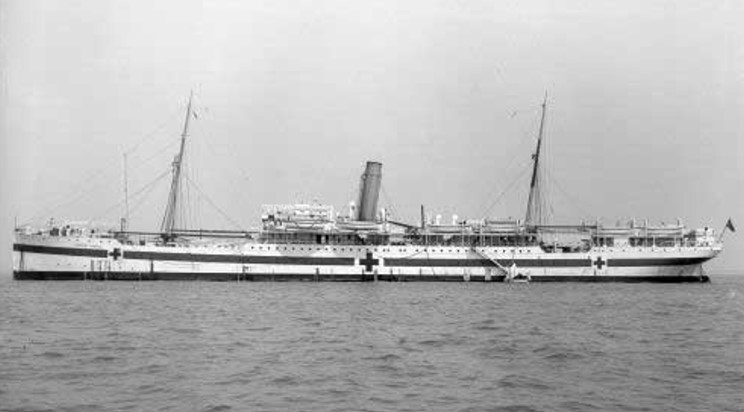|
The history of one ship shows the evolution of the war at sea during the Great War. On July 28, 1914 the Union-Castle liner Galacian sailed from Cape Town, South Africa en route home to England. She stopped at Mossamedes, Portuguese West Africa on Aug. 2 and unloaded several horses purchased by the Portuguese and sailed the same day. On the same day the North German Lloyd liner Kaiser Wilhelm der Grosse, which had fitted out as an armed merchant cruiser in mid-ocean, was commissioned into the Kaiserliche Marine. The Galacian was scheduled to stop at Teneriffe for coal, but on Aug. 4, 1914 war was declaired and the Galacian was informed by wireless. It was decided to head straight home instead of stopping for coal and her captain sailed on a more westerly course than normal, avoiding the shipping lanes that the Germans would begin to patrol. However on Aug. 15, 1914 the Galacian and the Kaiser Wilhelm der Grosse would meet 90 miles west of Teneriffe. The Galacian sent a radio message to Teneriffe asking if the route was clear as they wanted to put in for coal, fearing they would not have enough to make it home after all. They received the all clear, but the message was probably sent from the German ship. Soon the German approached and warned the Galacian not to send a distress signal, but the letters G-A-L had already been sent when a second warring was sent by the German telling them that if one more letter was sent they would fire on the bridge of the ship, the distress signal stopped. They were then ordered to follow the German liner, which they did. When the ships stopped, the Germans sent a boat with two officers and several sailors, they came aboard and were met by the captain and ship's officers and taken to the captain's cabin. There the ship's papers were checked and confiscated, the cargo was inspected and two Army officers were taken prisoner by the Germans. The capture of the ship was accomplished without firing a shot and without any injuries. On board the Galacian tensions were high as nobody knew what to expect. They knew their ship would be sunk so the captain asked the Germans if they were going to land the passengers on one of the islands? The German reply was "we are not barbarians." This was clearly the case as the Germans even asked for, not took, quinine tablets, the British provided them with about 200 tablets. They were even offered boxes of cigars and cigarettes, which the Germans did not accept saying "We don't want it to be said that we robbed your ship." Still war being what it is they destroyed the radio equipment and threw it overboard. This was the beginning of the war when chivalry was still a high priority and the killing of women and children was still something one just did not do, and among the 39 passengers of the Galacian were a number of women and children. The Germans were ordered back to the Kaiser Wilhelm der Grosse and the ship was ordered to follow. The Germans, who were said to have showed the "utmost courtesy" throughout the whole episode, shook hands with the British officers and apologized to the passengers for the inconvenience they had caused them and left the ship, as they did the passengers gave them a cheer. They followed the German ship until 5am on Aug. 16 when Max Reymann, the commander of the German ship sent the following message "On account of your women and children I will not sink the ship. You are released. Bon Voyage." The captain made for Teneriffe and then for England arriving Aug. 25. Such was the first encounter of the Galacian with the Germans. In Sept. 1914 she was renamed Glenart Castle and later converted into a hospital ship. The next encounter I know of was on Mar. 1, 1917 when the HMHS Glenart Castle hit a mine in the English Channel, she was reportedly full of wounded from France and fortunately received only minor damage and made port with no casualties. This second encounter, this time with a mine, shows how the war progressed from a "gentlemans" war to a more deadly and serious conflict. The final encounter shows the final stage of evolution, all out war. On Feb. 26, 1918 the fully lit and marked hospital ship HMHS Glenart Castle was torpedoed without warning and sunk in the Bristol Channel by the German submarine UC-56. She was empty of wounded, but full of hospital personnel, in this case at least 155 people were killed, including women, only 29 survived. |
© 2008 Michael W. Pocock MaritimeQuest.com |
 |
| HMHS Glenart Castle, date and location unknown. |
2007 Daily Event |
||